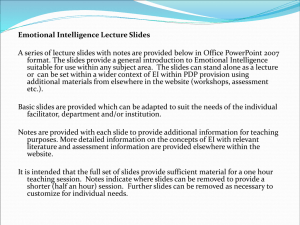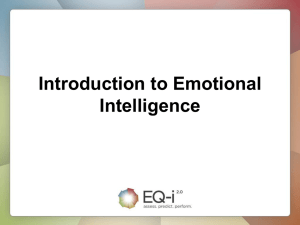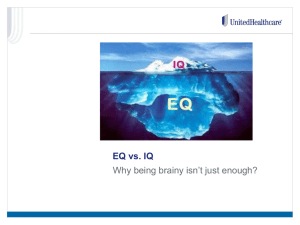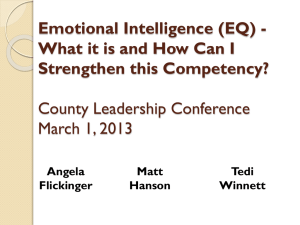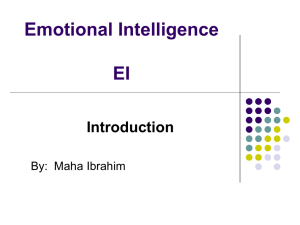Emotional Intelligence
advertisement
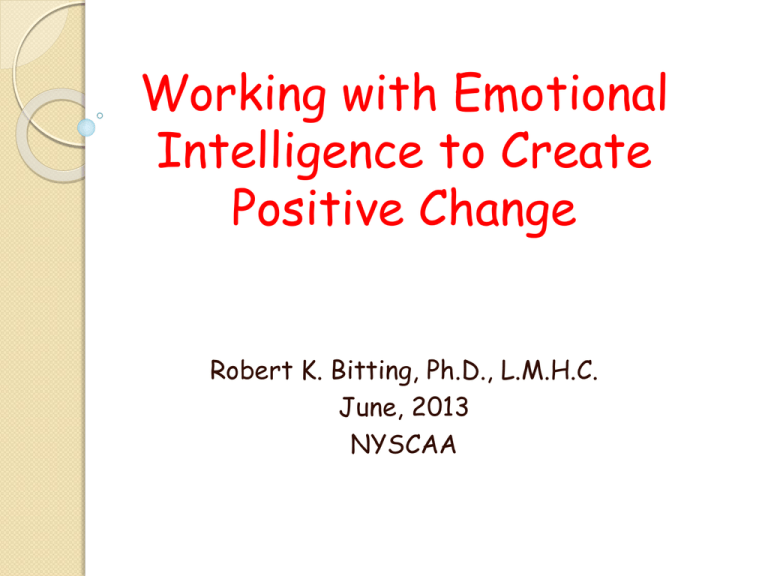
Working with Emotional Intelligence to Create Positive Change Robert K. Bitting, Ph.D., L.M.H.C. June, 2013 NYSCAA What is Intelligence? Typically focused on: ◦ ◦ ◦ ◦ ◦ ◦ analytic reasoning verbal skills spatial ability attention memory judgment Murky concept with definitions by many experts... What’s the key? IQ: A weak predictor for ◦ Achievement ◦ Job performance success ◦ Overall success, wealth Still a component of employment/career success; maybe 20-25% So, where’s the rest come from? One Place: Emotional Intelligence How we perceive emotions and facilitate thought. How we understand and manage emotions. Refers to feelings that a person has in a relationship. Capacity to reason with emotions and emotional signals – self and others. Self-awareness, social awareness, selfmanagement, relationship management. What’s Your Definition? Two Important People: Carl Rogers (and the Big “E”) and… The “Godfather” of E.I. Albert Ellis Rational Emotive Behavior Therapy Connection Between How We: Think, Feel and Behave The Idea of “Changing the Thought, Changing the Behavior” Thoughts Feelings Behaviors Thoughts YOU (CHOICE) Feelings Behaviors Ellis: ABCDE A – Activating or “red flag” event B – Belief or Behavior C – Consequences (Emotional or other) D – Dispute w/ more rational/realistic expectations (Choose to “reframe”) E – Effects (positive) of these more rational beliefs/behaviors Ellis: Typical Thinking Errors Ignoring the Positive Exaggerating the Negative Overgeneralizing QUIT MUSTERBATING!! Three Key Questions: What Do You Want? What Are You Doing To Get What You Want? How’s It Working? (Also, quit awfulizing and whining!) Based On Acceptance (Unconditional) Self Others Life Really?: Let’s hear what Ellis has to say about this! So…more potent predictors of Career Success are: Ability to handle frustrations Manage own emotions Manage own social skills Problem: how we’ve historically viewed emotions: •Chaotic •Haphazard •Superfluous •Incompatible with reason •Disorganized •Largely visceral •Resulting from the lack of effective adjustment How we are now viewing emotions: •Arouse, sustain, direct activity •Part of total economy of living organisms •Not in opposition to intelligence •A higher order of intelligence Emotional processing may be an essential part of rational decision making Evolutionary Advantage to Emotion For example: ◦ Fight or flight response ◦ But… Can basic emotions overwhelm rational thinking? ◦ Have you ever been “HIJACKED”? To Get at Emotion, Go Deep... Amygdala is deep within the most elemental Parts of the brain. The main purpose of the innermost part of the brain is survival. Basic Emotions—we all have ‘em – are they “hard-wired” or learned? The “4 Core” Joy Sadness Anger Fear Others? So (Again) What is Emotional Intelligence (EI)? The capacity for recognizing our own feelings and those of others, for motivating ourselves, and for managing emotions well in ourselves and in our relationships. •“Being nice” •a field in infancy •Letting feelings •fast-growing hang out” •aspects harken to research of the 1940’s Emotional self-awareness The inability to notice our true feelings leaves us at their mercy. People with greater certainty about their feelings are better pilots of their lives and have a surer sense about how they feel about personal decisions. How do you stay open to your emotional experiences?-can we tolerate the full range? Self-awareness Value of taking time for selfawareness requires abilities to recognize appropriate body cues and emotions to label cues and emotions accurately to stay open to unpleasant as well as pleasant emotions Includes the capacity for experiencing and recognizing multiple and conflicting emotions Emotional Self Awareness Managing One’s Own Emotions EI is like a smoke alarm. EI tells us a particular emotion is arising. Tremendous individual variability visà-vis duration and intensity of emotion. EI can help us “reframe” and move forward more quickly. Self regulatio n Out of Control Emotions Impair reasoning (even smart people sometimes act stupidly – example?) May increase the likelihood that chronic emotional problems will result, (e.g., clinical depression or chronic anxiety or hostility) Using emotions to maximize intellectual processing and decisionmaking: As a person matures, emotions begin to shape and improve thinking by directing a person’s attention to important changes. Example: Learning to Delay Gratification SelfMotivation Utilizing mild emotional swings to more effectively: Promote or hinder motivation - anxiety, hostility, sadness • • Understand emotional swings to increase perspective on future events. Read Blink, by Malcolm Gladwell – a great book for “reading” other people! Developing empathy Empathy is the ability to recognize another’s emotional state, which is very similar to what you are experiencing. “Here I am, as I am” leads us closer to conditions for Unconditional Acceptance, Social Interest, and the Big E. social awareness Developing empathy also links to: Greater emotional stability Greater interpersonal sensitivity Better school and work performance Developing empathy The Art of Social Relationships-managing emotions in others Effective friend, negotiator, and leader. Ability to guide interactions, inspire, and make others. comfortable in social situations Influence and persuade others. The “Dark Side”:The danger of the nice personality Have you ever met a nice person, but the “bells have gone off?” Charisma draws in but not always to desired ends, e.g., Hitler, Jim Jones. Empathy can be faked; so can other emotions. Anyone you know? The Development of “EI” A genetic contribution is likely But it is not destiny Early expression of emotion by parents helps learning Early abuse hinders learning Poor ability to read others’ emotions may lead to the development of poor social skills. Emotion-Related “Dysfunction” (the Everyday Type!) Can lead to THE 4 HORSEMEN of Negative Emotions: Defensiveness Stonewalling Criticism CONTEMPT!! Impacts on physical health: Cardiovascular disease Progression of diabetes, cancer, hypertension OVERALL BAD STUFF Dysfunction at Work Questions to Ask: Is the person in the wrong job? Does the job require the person to be difficult? What is remarkable about the group dynamics of the organization? What about individuals, personal and interpersonal? Importance of EI to Organizations: 50% of work satisfaction is determined by the relationship a worker has with… his/her boss. EI is a prerequisite for effective leadership across borders. ◦ Requires a high level of self-mastery and people skills; ability to put yourself into the positions of others. What is Improving EI Worth? Increases retention. Decreases absenteeism. Increases overall organizational growth. Could increase production as much as 20% Current estimates to American Business: Losing between $5.6 and $16.8 Billion annually TAKING THE TIME FOR MINDFULNESS Recognizing and naming emotions Understanding the causes of feelings Nine Strategies for Differentiating between emotion and the need to take action Preventing depression through “learned optimism” Managing anger through learned behavior or distraction techniques Listening for the lessons of feelings Using “gut feelings” in decision making Developing listening skills Promoting Emotional Intelligence Using E.I. in the Workplace • Should skills related to EI find their way into workplace strategic planning? • Can such skills be effectively developed in the workplace? • Would the introduction of skills related to EI radically modify the workplace – and if so, how? • How does effective customer service relates to the basic concepts of E.I.? • What is the EI skill set applied to where you work?
